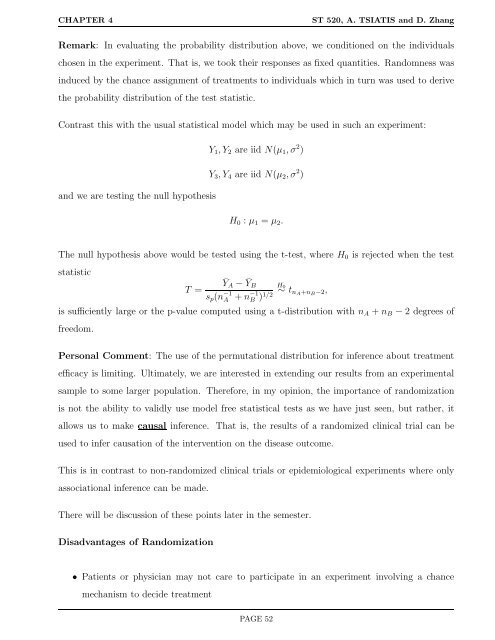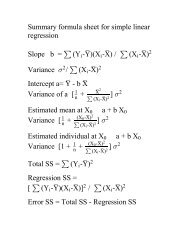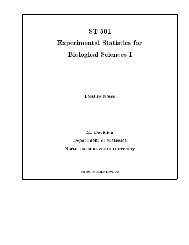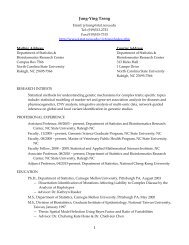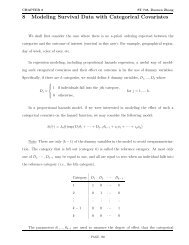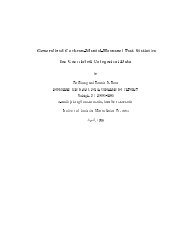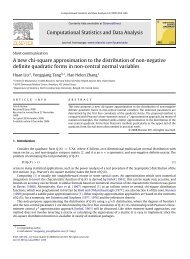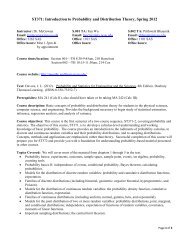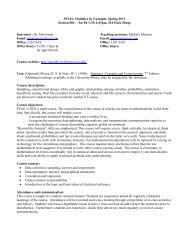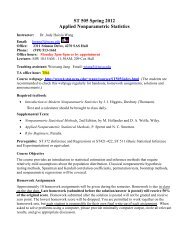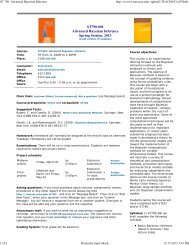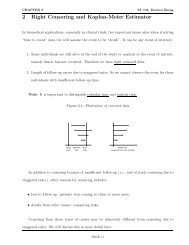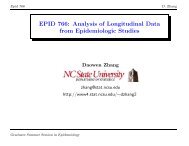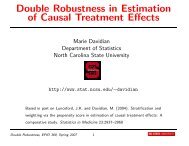ST 520 Statistical Principles of Clinical Trials - NCSU Statistics ...
ST 520 Statistical Principles of Clinical Trials - NCSU Statistics ...
ST 520 Statistical Principles of Clinical Trials - NCSU Statistics ...
Create successful ePaper yourself
Turn your PDF publications into a flip-book with our unique Google optimized e-Paper software.
CHAPTER 4 <strong>ST</strong> <strong>520</strong>, A. TSIATIS and D. Zhang<br />
Remark: In evaluating the probability distribution above, we conditioned on the individuals<br />
chosen in the experiment. That is, we took their responses as fixed quantities. Randomness was<br />
induced by the chance assignment <strong>of</strong> treatments to individuals which in turn was used to derive<br />
the probability distribution <strong>of</strong> the test statistic.<br />
Contrast this with the usual statistical model which may be used in such an experiment:<br />
and we are testing the null hypothesis<br />
Y1, Y2 are iid N(µ1, σ 2 )<br />
Y3, Y4 are iid N(µ2, σ 2 )<br />
H0 : µ1 = µ2.<br />
The null hypothesis above would be tested using the t-test, where H0 is rejected when the test<br />
statistic<br />
T =<br />
¯YA − ¯ YB<br />
sp(n −1<br />
A + n −1<br />
B ) 1/2<br />
H0<br />
∼ tnA+nB−2,<br />
is sufficiently large or the p-value computed using a t-distribution with nA + nB − 2 degrees <strong>of</strong><br />
freedom.<br />
Personal Comment: The use <strong>of</strong> the permutational distribution for inference about treatment<br />
efficacy is limiting. Ultimately, we are interested in extending our results from an experimental<br />
sample to some larger population. Therefore, in my opinion, the importance <strong>of</strong> randomization<br />
is not the ability to validly use model free statistical tests as we have just seen, but rather, it<br />
allows us to make causal inference. That is, the results <strong>of</strong> a randomized clinical trial can be<br />
used to infer causation <strong>of</strong> the intervention on the disease outcome.<br />
This is in contrast to non-randomized clinical trials or epidemiological experiments where only<br />
associational inference can be made.<br />
There will be discussion <strong>of</strong> these points later in the semester.<br />
Disadvantages <strong>of</strong> Randomization<br />
• Patients or physician may not care to participate in an experiment involving a chance<br />
mechanism to decide treatment<br />
PAGE 52


